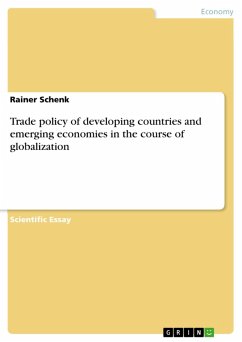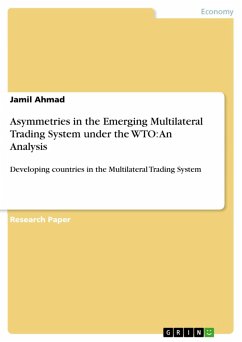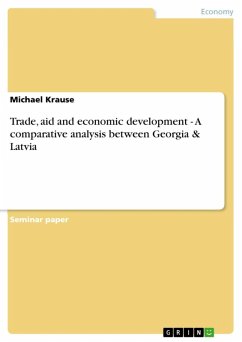Scientific Essay from the year 2012 in the subject Economics - International Economic Relations, , language: English, abstract: The current global economy is characterized by extensive globalization of the markets. The accompanying international trade affects industrial nations and developing countries in differing degrees. The analysis of trade policy in developing countries can, in the process, be analyzed using the same tools as those for developed countries, namely industrial na-tions. Earlier development stages of trade policy amongst developing countries were character-ized by protectionism and an orientation towards a domestic market which consequently led to a weak internationalization of these countries. It was not possible to decrease the distance between the classical industrial states since the industrial states themselves, in the context of the first phase of globalization, were able to significantly advance on a global scale. As a result of the rejection of protectionism by means of changing political structures and the accompanying liberalization, it was therefore possible, in the early phases of globaliza-tion, whose origins lie in the end of the 19th and the start of the 20th century, for several developing countries to successfully advance in the wake of the general dynamic of inter-nationalization. The share in the world good's market; the volumes in direct investments and the inflows of portfolio capital were able to increase amongst these groups of countries, albeit not for all countries to the same extent. As a result, the majority of developing countries today are tightly embedded in world trade. Moreover, these countries were capable of registering export quotas of 20% and 30%. The gap between the so-called OECD countries could be largely made up for. In the course of early globalization, the OECD countries also dynamically developed with the consequence that many developing countries were, in turn, able to benefit from these global economic interactions. Today, the export revenue of OECD countries with develop-ing countries represents 25%. This is a 40% increase within the last 20 years. The foreign trade of developing countries with OECD countries, on the other hand, ac-counts for merely 60% of the total foreign trade of developing countries in our present day. At the same time, there has been an emergence of foreign trade diversification in favor of exporting industrial goods by courtesy of developing countries which amounted to as much as 84% in 1996 which in 1996 accounted for as much as 84%.
Dieser Download kann aus rechtlichen Gründen nur mit Rechnungsadresse in A, B, BG, CY, CZ, D, DK, EW, E, FIN, F, GR, HR, H, IRL, I, LT, L, LR, M, NL, PL, P, R, S, SLO, SK ausgeliefert werden.









